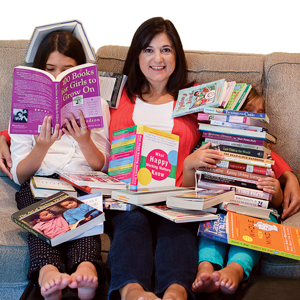I’ve been turning to books for answers my whole life. In elementary school, Are You There God? It’s Me, Margaret by Judy Blume eased my transition into puberty. As a teenager, the anonymous diary Go Ask Alice taught me the valuable lesson to “Just say no” to drugs. And in my twenties, I read just about every self-help book on the market as I traversed the globe trying to find myself. So it really isn’t a surprise that when I had kids, parenting books became a permanent fixture on my nightstand, on my coffee table, in my backpack. You get the idea.
However, I’ve learned over the last ten years that information on child-rearing walks a fine line between empowering and overwhelming. Just as there’s more to winning the heart of Mr. Right than following The Rules from Ellen Fein and Sherrie Schneider, good parenting strikes a balance between expert opinion and personal style – like letting your kid watch a little extra TV when they are home sick with the flu.
As my children age, I’m surprised by the number of people who admittedly can’t be bothered with parenting books or are quick to claim they outgrew them years ago. I get that most people are too busy parenting to read the latest and greatest titles, which is why I started blogging at Parenting by the Book in the first place. But quite honestly, in this age of hyper-parenting, one of the things that has kept me sane has been writing about the forty-six titles you’ll find online at RFMonline.com (under the Community tab). Along the way, expert after expert has reassured me, urging me to forget about the Joneses and guiding me along a less-is-more path.
Let’s face it – while we’ve all been frantic or frazzled at one point or another since becoming parents, the reality is, it’s no way to live long-term. That said, you might consider picking up one of these titles, as they’ve influenced me the most. But if you can’t find the time, don’t worry: I’ll continue to read the parenting books so you don’t have to…
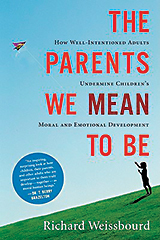 The Parents We Mean to Be
The Parents We Mean to Be
by Richard Weissbourd
Sometimes, well-intentioned adults undermine their children’s moral and emotional development, Richard Weissbourd claims. And while I hate to admit it, I know he is right, for rarely do I negotiate with my kids and have it yield the results I intend. He explains that nowadays parents are too eager to earn their child’s approval, which prevents them from providing the high moral standards and firm discipline children need. As far as Weissbourd is concerned, “Children have no incentive to become like us – because the message we’re giving is that they already are.” Gone is the learning curve of our youth. As a result, children now perceive their achievement failures as personal failures. Even though this places them at risk of achieving the happiness we’re sacrificing so much to give them, Weissbourd argues many parents can’t seem to let up when it comes to maximizing their child’s potential. I’m no stranger to the fear that my children won’t be able to compete. Still, the last thing I want is for them to feel the need to lie about their success in school or cover up their anxieties, as Weissbourd warns they will. That’s why I’m trying to heed Weissbourd’s call to stop clinging to rationalizations of the importance of achievement or good motives. Reading The Parents We Mean to Be gave me the extra push I needed to make sure my words matched my actions.
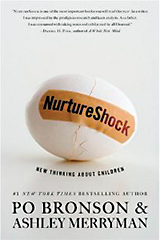 Nurture Shock
Nurture Shock
by Po Bronson and Ashley Merriman
This book contains new thinking about children in two key areas: praise and sleep habits.
Increasingly, information indicates that children at the very top of the charts often lack the confidence in their abilities to tackle routine school challenges. Bronson and Merriman explain, “They underrate the importance of effort, and they overrate how much help they need from a parent.” Nurture Shock provides persuasive research on how praising your child’s intelligence not only fails to boost self-esteem, but also prevents her from performing at her best. As a teacher, this idea of giving specific feedback on a job well-done was something I’d been practicing for years in my classroom; however, I hadn’t really applied the same strategy at home with any consistency until reading about it in Nurture Shock.
Couple these self-esteem issues with the fact that kids aren’t getting the rest they need and it’s really problematic. “Around the world, children get an hour less sleep than they did thirty years ago” and Bronson and Merriman conclude the high costs: “IQ points, emotional well-being, ADHD, and obesity.” Parents who are accustomed to sleep deprivation might wonder why their children aren’t capable of operating under similar circumstances, especially if the lack of sleep means the teenagers can take on more honors classes and extracurricular activities. Until reading Nurture Shock I had never realized how a child’s sleep is qualitatively different than ours, which is why it’s so important for long-term learning. Since setting stricter bedtimes, my kids have had the energy they need to tackle tasks with confidence.
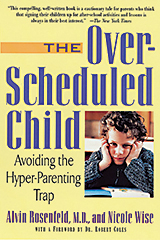 The Over-Scheduled Child
The Over-Scheduled Child
by Alvin Rosenfeld and Nicole Wise
Avoiding the hyper-parenting trap is difficult. According to Rosenfeld and Wise, “When it comes to making life good for our children, we are not quite sure where reason ends and Ridiculous begins… relatively speaking, our lives are charmed. Yet rather than feeling grateful, many of us feel anxious, precarious, and vulnerable.” Admit it. You can relate. I know I could. And I didn’t want to because we do have a great life. According to Rosenfeld and Wise, every single thing we do doesn’t matter. What a relief, right? They say while we see ourselves as simply trying to do what is best for them, from our children’s perspective, they feel criticized all the time, as if nothing they do is good enough. These authors say we have to move the emphasis away from perfection and perpetual motion because it’s destroying family life. The authors effectively argued childhood is no longer “preparation for adulthood but a performance in its right.” Why has this happened?Rosenfeld and Wise will tell you that since we no longer need our children to help out on our land or in our house, their purpose has become to make us proud and happy. Essentially, by the time I finished reading The Over-Scheduled Child, I cut our commitments in half and we have all been better off for it.
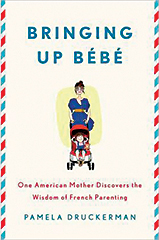 Bringing Up Bébé
Bringing Up Bébé
by Pamela Druckerman
Although not your typical parenting book, this informative story about how an American mom finds such wisdom in French parenting is by far my favorite narrative. Druckerman claims that French children are not only better eaters, but they are also better sleepers, and their parents are more relaxed. Part of the reason her story is so effective is because Druckerman is a journalist, who unlike the infamous writer behind Tiger Mom, actually backs up her observations with extremely powerful research. Unlike American parents, whose children’s happiness often comes at the cost of their own, Druckerman notes that “French parents don’t worry that they’re going to damage their kids by frustrating them. On the contrary, they think their kids will be damaged if they can’t cope with frustration.” One of the most appealing ideas of Bringing up Bébé is her resolve to “become less Carrie Bradshaw and more Catherine DeNeuve.” French moms have no desire to be labeled “super moms,” and instead strive for a balanced Demeanor, pre-baby identities, and no guilt. In the end, Bringing up Bebe offers not only a very different view of childhood, but also a very different view of what it means to be a parent. And now whenever I find myself losing my cool, my husband teases, “Think French.”
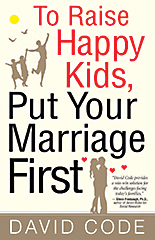 To Raise Happy Kids Put Your Marriage First
To Raise Happy Kids Put Your Marriage First
by David Code
I’m going to be honest. My husband laughed when he saw this book. “What a joke,” he said. “The kids will always come before me.” And even though I’d label mine a good marriage, I have to agree. Still, I learned a lot from Code, who maintains “Your children’s problems are much more connected to your marriage than you probably realize.” An American couple getting married these days has an alarmingly low chance of staying together and Code presents the information on emotional divorce in such a way that it made me want to reinstate date night immediately. Code looks at three myths harming families: the more attention we give our kids, the better they’ll turn out; arguing leads to divorce; and if we feel unfulfilled in our marriage, it’s because we married the wrong person. According to Code, a fulfilled parent is less needy. “It’s not about how much time we spend with our children, or making them the center of our lives. That just leaves parents anxious and exhausted.” Code claims the key to stopping a good marriage from going bad is learning how anxiety controls our behavior.
Ultimately, To Raise Happy Kids Put Your Marriage First, like all the other titles featured here and the majority of the ones I’ve blogged about at Parenting by the Book, affirmed what I already knew: There has to be a balance between tending to ourselves, our marriages, and our children. But in our success-at-all-cost society, it’s great to have parenting books to remind us.
From the Publisher
I’ll admit it, the last parenting book I read cover to cover was The Girlfriend’s Guide to Pregnancy (hysterical, by the way!). I think I bought What to Expect the First Year with a Babies R Us gift card, but after the first month, I’m pretty sure it was used primarily as a door-stopper.
I hear others talk about great parenting books all the time, and I see lots of titles I’d like to grab from the library and bookstore. But darn it, I always seem to be too busy parenting to read about how to do it right – or quite possibly to validate that I’m doing an okay job of it after all.
Enter Victoria with our fabulous Parenting by the Book blog, and – voila! my problem is solved. She reads the books so I don’t have to. This is the person I try to get my husband to be on the home front, tossing the boring, but presumably important mail, school forms, and owner’s manuals his way with a plea to “summarize, please!”
As parents, we are busy, there’s no doubt about it, which is exactly what I was thinking when I founded Richmond Family Magazine. Our lives are hectic, yes, but we still want and need information, delivered in a concise, enlightening, and upbeat fashion. Based on the rate each issue of RFM flies off the racks each month, I think we’ve found a winning formula! The same goes for Parenting by the Book – it’s informative, entertaining, and it doesn’t take hours out of your day to read. Remember CliffsNotes? Similar idea. If you haven’t checked out RFM’s book blog, click the green “B” at the top right of the home page. There you’ll find titles that stirred up controversy and made national headlines, like Battle Hymn of the Tiger Mother, and others that leave you laughing out loud, like Ketchup is a Vegetable and Other Lies Moms Tell Themselves. We even cover that “big” little word, s-e-x, with several very enlightening blog posts about the book Everything You NEVER Wanted Your Kids to Know about SEX (But Were Afraid They’d Ask). Victoria, when this day comes in my household, I’m sending my kids over to you!
Do you have a parenting book that affected you so deeply that you’d like to share it with other busy parents? Let us know! Email the title to editor@rfmonline.com and Victoria might blog about it. Or better yet, check in with Parenting by the Book on Facebook, or give Twitter a try and tweet the title to @WinterhalterV.


